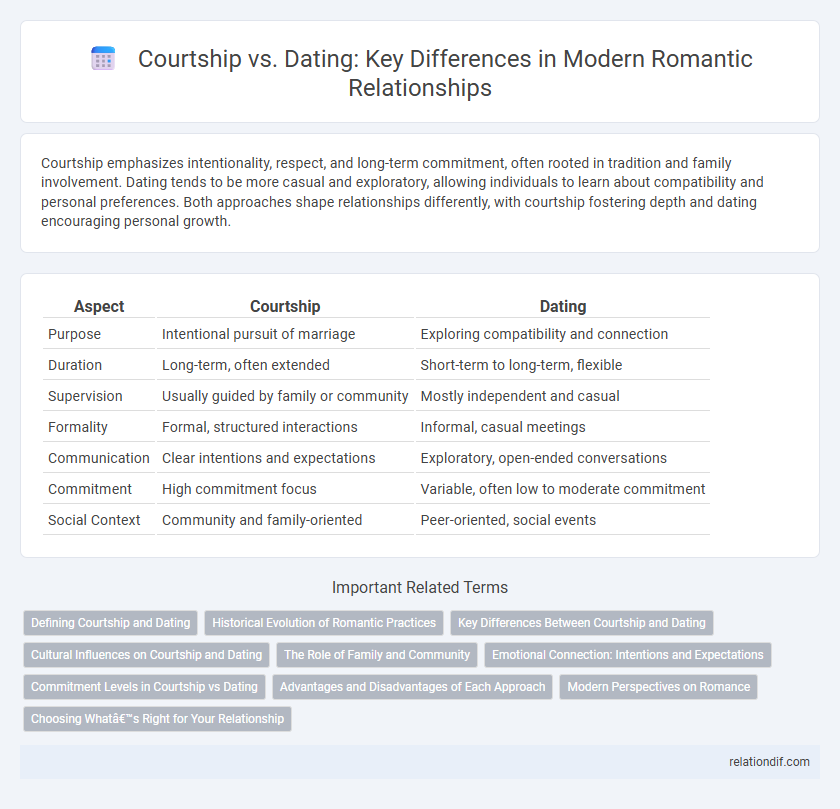Courtship emphasizes intentionality, respect, and long-term commitment, often rooted in tradition and family involvement. Dating tends to be more casual and exploratory, allowing individuals to learn about compatibility and personal preferences. Both approaches shape relationships differently, with courtship fostering depth and dating encouraging personal growth.
Table of Comparison
| Aspect | Courtship | Dating |
|---|---|---|
| Purpose | Intentional pursuit of marriage | Exploring compatibility and connection |
| Duration | Long-term, often extended | Short-term to long-term, flexible |
| Supervision | Usually guided by family or community | Mostly independent and casual |
| Formality | Formal, structured interactions | Informal, casual meetings |
| Communication | Clear intentions and expectations | Exploratory, open-ended conversations |
| Commitment | High commitment focus | Variable, often low to moderate commitment |
| Social Context | Community and family-oriented | Peer-oriented, social events |
Defining Courtship and Dating
Courtship involves a purposeful approach to building a long-term relationship often with the intention of marriage, focusing on deep emotional connection and family involvement. Dating emphasizes casual interactions and personal enjoyment, allowing individuals to explore compatibility without immediate commitment. The distinction lies in courtship's structured, intentional progression versus dating's flexible, exploratory nature.
Historical Evolution of Romantic Practices
Courtship historically emphasized formal rituals and family involvement to establish compatibility and social status, contrasting with modern dating, which prioritizes personal choice and emotional connection. During the 18th and 19th centuries, courtship often involved strict supervision and defined expectations, reflecting societal norms and gender roles of the time. The 20th century introduced dating as a more casual, individual-driven process, influenced by changing cultural attitudes, urbanization, and the rise of youth culture.
Key Differences Between Courtship and Dating
Courtship emphasizes intentionality and long-term commitment, often involving family approval and clear relationship goals, while dating typically centers on exploring mutual compatibility and personal enjoyment without immediate expectations. Courtship progresses with a structured approach aimed at marriage, contrasting with dating's flexible and casual nature, which may or may not lead to a committed relationship. Emotional boundaries and traditional values are more prominent in courtship compared to the more relaxed and experimental interactions found in dating.
Cultural Influences on Courtship and Dating
Cultural influences deeply shape courtship and dating practices, dictating acceptable behaviors, gender roles, and communication styles across societies. In collectivist cultures, courtship often involves family approval and community rituals, whereas individualistic cultures emphasize personal choice and romantic autonomy in dating. These cultural frameworks impact relationship progression, expectations, and emotional expression, highlighting diverse approaches to love and partnership worldwide.
The Role of Family and Community
Courtship often involves the active participation and approval of family and community, reinforcing cultural values and long-term commitments. Dating emphasizes individual choice and personal connection, with less direct involvement from relatives or social groups. The influence of family and community in courtship can shape relationship expectations and stability, contrasting with the more flexible and autonomous nature of dating.
Emotional Connection: Intentions and Expectations
Courtship emphasizes building a deep emotional connection through intentional communication and clear expectations, fostering trust and mutual respect. Dating often prioritizes exploration and casual interaction, sometimes leading to ambiguous intentions and varied emotional investment. Understanding these differences helps individuals align their relationship goals with their emotional needs and commitment levels.
Commitment Levels in Courtship vs Dating
Courtship typically involves a higher commitment level, emphasizing long-term intentions and serious evaluation for marriage, whereas dating often allows more casual interactions with less immediate pressure for exclusivity. In courtship, partners engage in deliberate steps guided by cultural or familial expectations to ensure compatibility, while dating prioritizes exploration and personal connection without immediate commitment. This fundamental difference influences how individuals navigate emotional investment and future planning within their romantic relationships.
Advantages and Disadvantages of Each Approach
Courtship offers a structured, traditional pathway emphasizing family involvement and intentional commitment, fostering deep emotional bonds but sometimes limiting spontaneity and modern social interactions. Dating allows greater social freedom and the chance to explore compatibility with multiple partners, promoting personal growth while risking ambiguity and less clear relationship intentions. Both approaches present unique benefits and challenges depending on individual values and relationship goals.
Modern Perspectives on Romance
Modern perspectives on romance emphasize the distinction between courtship and dating, with courtship viewed as a traditional, intention-driven process focused on long-term commitment and often involving family involvement. Dating is typically characterized by casual interactions, personal exploration, and fluid relationship boundaries prioritizing individual preferences and emotional compatibility. The rise of digital platforms and changing social norms have reshaped both practices, increasing the emphasis on communication, consent, and mutual respect in forming romantic connections.
Choosing What’s Right for Your Relationship
Courtship emphasizes intentionality and long-term commitment, fostering emotional depth through structured interactions often guided by shared values or family involvement. Dating allows for exploration and personal freedom, enabling individuals to assess compatibility across diverse experiences and relationship dynamics. Selecting the right approach depends on mutual relationship goals, communication styles, and cultural or personal beliefs about romantic progression.
Courtship vs Dating Infographic

 relationdif.com
relationdif.com